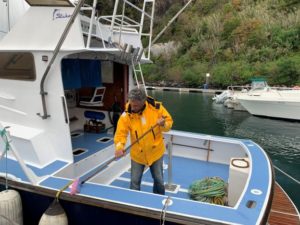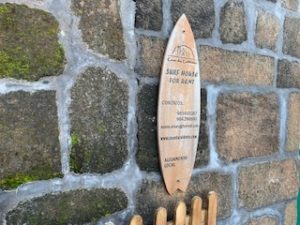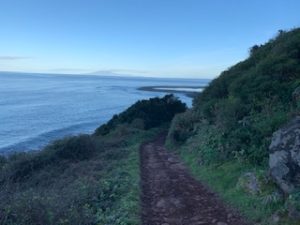Ricardo C Correia (47), Azores
Interview conducted in Velas, São Jorge Island
I must be a bit of a romantic as my interview with Fatima and Cristiano had me smiling as I walked into the marina. Down the dock I saw another person caring for their boat. I am even more enamored by the sea and her boats, remembering well cleaning the stern from my year spent as a sternman on a lobster boat in Maine. I introduced myself to Ricardo by letting him know that I used to be fisherman. Ricardo had visited Maine to help a friend pick up a boat. We chatted a places in Maine before the a light rain started. He invited me aboard his boat. Ricardo’s words follow.

What is your favorite part of living in São Jorge?
It is very safe. There is never any rush here. It is tranquil and people know nature and appreciate the environment. I have time to do projects. I surf a bit and work a bit. There is no pressure to do things now. You can live life by its natural rhythm.

What is your least favorite part of living in São Jorge?
It is a small place. We don’t have great access to health care. Projects must be well planned here. Equipment and resources are limited on a small island, but I do not regret the drawbacks.
Do you see the changes in the natural world where you live?
Yes, the weather is changing. We used to have four distinct seasons and now we only have two. They are dry and wet and windy. The weather events are getting stronger.
Patterns are changing all over the globe. The currents here are impacted by a part of the gulf stream. The Canary current turns here from the gulf of Mexico and flows down Africa. These currents are changing and impacting the migration of krill and pelagic schools of fish. The ocean levels are also rising.
Do you think these changes are from man’s activities?
Yes. Here the local commercial fisherman are allowed to chum schools of tuna with bait. They then sit on top of the school until they catch their limit and then decide which commercial boat will fish the school next. Smaller recreations or subsistence fisherman don’t get a chance to fish the school. It is like they are privatizing a public resource. There are now less fish for everyone.

I went to school in Rhode Island to be an environmental engineer. We have access to one of the larger water drainages in the Azores just on São Jorge east of fajã Santo Cristo. It has two permanent waterfalls. We looked into generating power using hydro for the northern fajãs since there is currently no power in fajã Santo Cristo. The project failed to gain momentum and as long as the oil companies control the electrical grid and have money to influence government decisions these projects will never get approved.
How do you think these changes will impact the Azores?
Fisherman have already started to notice changing resources. Both the fisherman and farmers will be impacted. The people relying on these activities for their livelihood will have to adapt their techniques.
Can you give me an example of something you are doing to reduce your impact on the planet?
My wife and I bought a building on fajã Santo Cristo that was ruined by the 1980 earthquake and are restoring it using recycled materials. We will open a tavern there next summer. We have found sources of local food. Some examples are crab, sweet potatoes, vegetables and local organic meat. We are building a traditional oven and will serve seasonal food prepared in traditional ways. Breads and fish stews will be on the menu.
I also saved this boat. She is a 1969 striker and she has been my school. My welding teacher said that necessity sharpen tools. I knew nothing about welding, DC power or carpentry before I bought this. Only a few things are new and I found the pieces that I couldn’t find in the Azores on Ebay. I am going to trade her for a sailboat to minimize my impact.
Is there anything you would like to ask or tell me?
A friend from England told me that the Azores could be a world model for sustainable low-impact economy. The government must help though. I used to work as an environmental engineer for the Azore’s government. If you don’t submit, compromise and your research doesn’t match politics then it isn’t viewed as good. I developed quite a bit of grey hair and had lost too much energy fighting for youthful ideals, so stopped being an engineer and went into business for myself. Now I am living life.
Many of us are very concerned about Trump. Trying to go back to a 19th century power source, coal, is a big concern. Taxing China might be good though. I don’t think he has enough concern for the environment and in underestimating the impact on the future. He should think about the future financial cost of some of his actions.
I remember when I went shopping with my grandmother as a child. Everything was packaged in recycled paper. We used to bring glass bottles back to the manufacturer and get a refund. They containers would be reused. These things have to start happening again and it must be a global effort.
We have a daughter who is seven, and she is in second grade. I am happy to see that the new generation is being brought up with an awareness of the importance of nature and conservation.
Ricardo continued to teach me a great deal about the history of the Azores. He discussed population losses in 50s, 60s and 70s due to natural and political disasters. He was also passionate about importance of the Azores in the development of the modern world. He was happy to be a face of climate change from the Azores but seemed to want to encourage everybody to be a citizen of the world.
There was a toughness to the old life, the more subsistence based living of grow and sourcing/trading ones own needs from neighbors instead of buying it from shelves. Many left these land for dreams of an easier new world life. I have interviewed so many that have come back, trading these conveniences for a simpler life they described as more enjoyable. A life where they actually live. The people who are doing this tell me they are happy and certainly look it.
-Matt Ryle